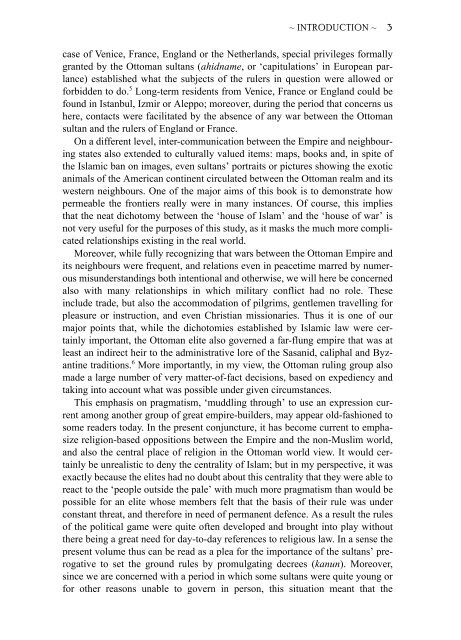The Ottoman Empire and the World Around It - Course Information
The Ottoman Empire and the World Around It - Course Information
The Ottoman Empire and the World Around It - Course Information
Create successful ePaper yourself
Turn your PDF publications into a flip-book with our unique Google optimized e-Paper software.
~ INTRODUCTION ~ 3<br />
case of Venice, France, Engl<strong>and</strong> or <strong>the</strong> Ne<strong>the</strong>rl<strong>and</strong>s, special privileges formally<br />
granted by <strong>the</strong> <strong>Ottoman</strong> sultans (ahidname, or ‘capitulations’ in European parlance)<br />
established what <strong>the</strong> subjects of <strong>the</strong> rulers in question were allowed or<br />
forbidden to do. 5 Long-term residents from Venice, France or Engl<strong>and</strong> could be<br />
found in Istanbul, Izmir or Aleppo; moreover, during <strong>the</strong> period that concerns us<br />
here, contacts were facilitated by <strong>the</strong> absence of any war between <strong>the</strong> <strong>Ottoman</strong><br />
sultan <strong>and</strong> <strong>the</strong> rulers of Engl<strong>and</strong> or France.<br />
On a different level, inter-communication between <strong>the</strong> <strong>Empire</strong> <strong>and</strong> neighbouring<br />
states also extended to culturally valued items: maps, books <strong>and</strong>, in spite of<br />
<strong>the</strong> Islamic ban on images, even sultans’ portraits or pictures showing <strong>the</strong> exotic<br />
animals of <strong>the</strong> American continent circulated between <strong>the</strong> <strong>Ottoman</strong> realm <strong>and</strong> its<br />
western neighbours. One of <strong>the</strong> major aims of this book is to demonstrate how<br />
permeable <strong>the</strong> frontiers really were in many instances. Of course, this implies<br />
that <strong>the</strong> neat dichotomy between <strong>the</strong> ‘house of Islam’ <strong>and</strong> <strong>the</strong> ‘house of war’ is<br />
not very useful for <strong>the</strong> purposes of this study, as it masks <strong>the</strong> much more complicated<br />
relationships existing in <strong>the</strong> real world.<br />
Moreover, while fully recognizing that wars between <strong>the</strong> <strong>Ottoman</strong> <strong>Empire</strong> <strong>and</strong><br />
its neighbours were frequent, <strong>and</strong> relations even in peacetime marred by numerous<br />
misunderst<strong>and</strong>ings both intentional <strong>and</strong> o<strong>the</strong>rwise, we will here be concerned<br />
also with many relationships in which military conflict had no role. <strong>The</strong>se<br />
include trade, but also <strong>the</strong> accommodation of pilgrims, gentlemen travelling for<br />
pleasure or instruction, <strong>and</strong> even Christian missionaries. Thus it is one of our<br />
major points that, while <strong>the</strong> dichotomies established by Islamic law were certainly<br />
important, <strong>the</strong> <strong>Ottoman</strong> elite also governed a far-flung empire that was at<br />
least an indirect heir to <strong>the</strong> administrative lore of <strong>the</strong> Sasanid, caliphal <strong>and</strong> Byzantine<br />
traditions. 6 More importantly, in my view, <strong>the</strong> <strong>Ottoman</strong> ruling group also<br />
made a large number of very matter-of-fact decisions, based on expediency <strong>and</strong><br />
taking into account what was possible under given circumstances.<br />
This emphasis on pragmatism, ‘muddling through’ to use an expression current<br />
among ano<strong>the</strong>r group of great empire-builders, may appear old-fashioned to<br />
some readers today. In <strong>the</strong> present conjuncture, it has become current to emphasize<br />
religion-based oppositions between <strong>the</strong> <strong>Empire</strong> <strong>and</strong> <strong>the</strong> non-Muslim world,<br />
<strong>and</strong> also <strong>the</strong> central place of religion in <strong>the</strong> <strong>Ottoman</strong> world view. <strong>It</strong> would certainly<br />
be unrealistic to deny <strong>the</strong> centrality of Islam; but in my perspective, it was<br />
exactly because <strong>the</strong> elites had no doubt about this centrality that <strong>the</strong>y were able to<br />
react to <strong>the</strong> ‘people outside <strong>the</strong> pale’ with much more pragmatism than would be<br />
possible for an elite whose members felt that <strong>the</strong> basis of <strong>the</strong>ir rule was under<br />
constant threat, <strong>and</strong> <strong>the</strong>refore in need of permanent defence. As a result <strong>the</strong> rules<br />
of <strong>the</strong> political game were quite often developed <strong>and</strong> brought into play without<br />
<strong>the</strong>re being a great need for day-to-day references to religious law. In a sense <strong>the</strong><br />
present volume thus can be read as a plea for <strong>the</strong> importance of <strong>the</strong> sultans’ prerogative<br />
to set <strong>the</strong> ground rules by promulgating decrees (kanun). Moreover,<br />
since we are concerned with a period in which some sultans were quite young or<br />
for o<strong>the</strong>r reasons unable to govern in person, this situation meant that <strong>the</strong>


